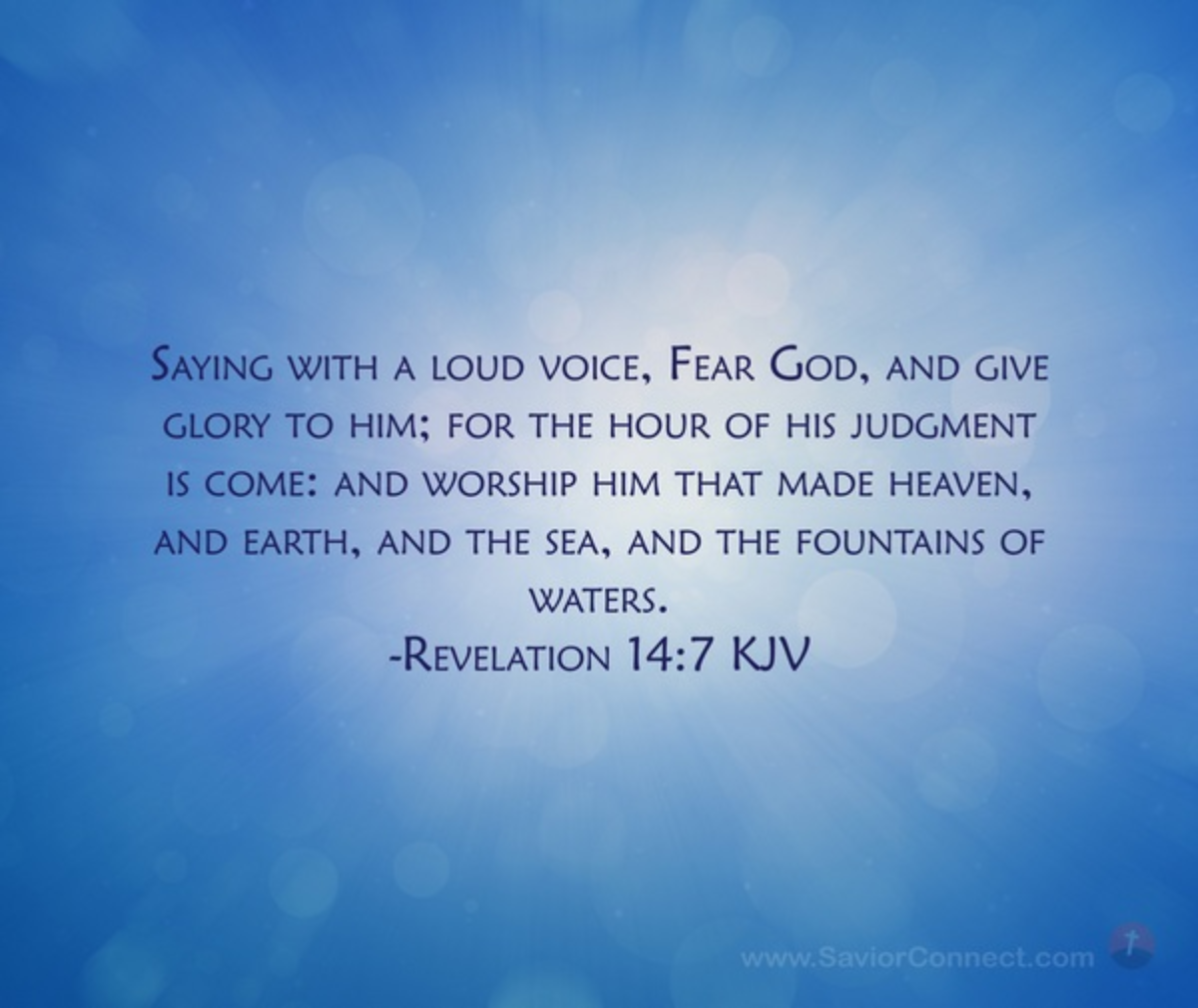“Fear GOD, and give Him glory, for the hour of His judgment has come. Worship Him who made heaven and earth and the sea and the springs of water.” – Rev. 14:7.
“Now these are the commandments, the statutes, and the judgments which the LORD your GOD commanded to teach you, so that you might do them in the land that you will cross over to possess, so that you might fear the LORD your GOD, to keep all His statutes and His commandments, which I command you, you and your son and your grandson, all the days of your life, and that your days may long continue.” – Deut. 6:1-2.
“Fear God” or “Fear the Lord” is a frequent directive found in the Old Testament, directed at the followers of God. As believers, the importance of this command is clear to us. A genuine fear of God liberates us from undue fear and the trepidation sown by Satan.
The comprehensive directive to ‘Fear God’ encompasses various facets of the relationship between God and humanity.
(1) A comprehensive understanding of the key elements associated with the concept of ‘fearing God’ is crucial. These elements encompass God’s holiness, justice, fairness, love, and grace. To genuinely know and understand God, one must grasp His essence, as Proverbs 2:5 articulates, “Then you will understand the fear of the LORD and discover the knowledge of God.” Such fear of God stems from recognizing that God is holy, and this intrinsic holiness validates His judgment of sin.
(2) The ‘Fear of God’ signifies that we should honor Him with profound respect and sanctity, recognizing His splendor, sovereignty, and power (Phil. 2:12). For instance, when God appeared on Mount Sinai amidst fire, thunder, lightning, dense clouds, and the blast of a trumpet, the Israelites were overwhelmed with fear (Ex. 19:16). They implored Moses to intercede with God, pleading, “Speak to us yourself and we will listen; but let not God speak to us, lest we die” (Ex. 20:18-19; Deut. 5:22-27). In acknowledging God as the creator of everything, David declares, “Let all the earth fear the Lord; let all the inhabitants of the world stand in awe of Him. For He spoke, and it came into being; He commanded, and it stood fast” (Ps. 33:8-9).
(3) The genuine fear of God compels believers to depend on Him for salvation, bolstered by steadfast faith. For instance, the Israelites’ crossing of the Red Sea and their observation of the Egyptian army’s annihilation filled them with a reverential fear of God, reinforcing their trust in Him, as recorded in Exodus 14:31. The Psalmist reiterates this notion in Psalm 115:11, urging, “You who fear the Lord, trust in Him; He is their help and shield.” Such awe of God fosters a resilient faith and reliance on Him. Consequently, those who hold this fear are often depicted as being close to salvation, as Psalm 85:9 suggests, “Surely His salvation is near to those who fear Him.” They are also recipients of God’s pardoning love and mercy, as mentioned in Luke 1:50, Psalm 103:11, and Psalm 130:4.
(4) The fear of God helps us recognize His disdain for sin and His authority to discipline those who violate His laws. This concept has been illustrated throughout history, as depicted in Psalm 76:7-8, which reads, “You alone are to be feared; who can stand before you when you are angry? From heaven you pronounced judgment, and the land feared and was quiet.” Similarly, Adam and Eve concealed themselves from God in fear after their transgression in the Garden of Eden (Gen. 3:8-10). Moses, too, experienced this fear when he interceded for mercy on behalf of the Israelites, declaring in Deuteronomy 9:19, “For I was afraid of the anger and hot displeasure of the Lord, for He was wrathful enough to destroy you. Yet once more the Lord heeded my plea.” The apostle Paul reiterates this sentiment in his epistle to the Hebrews, stating, “It is a dreadful thing to fall into the hands of the living God” (Heb. 10:31). This fear is warranted, for God is sacred, abhors sin, and will inevitably judge those who spurn Him and defy His commands.
REASONS TO FEAR GOD
(1) God is described as omnipotent, which means He is all-powerful. As the creator of all people and things, it is said that we should hold Him in reverence and awe. This concept is highlighted in several passages of the Bible, including Psalms 33:6-9, Psalms 96:4-5, and Jonah 1:9.
(2) The might of God, by which He wields power over us and all creatures, compels us to hold Him in awe (Ex. 20:18-20; Eccl. 3:14; Jonah 1:11-16; Mark 4:39-41).
(3) God is sacred and abhors sin. It is common for people to fear God, particularly when He opposes sin. As expressed in Revelation 15:4, “Who shall not fear Thee, O Lord, and magnify Thy name? For Thou alone art holy. All nations shall come and worship before Thee, for Thy judgments have been made manifest.”
(4) The resplendent glory of God compels all to revere Him, as depicted in Matthew 17:1-8.
(5) It is important to hold reverence for God due to the continuous blessings we receive, including good health, nurturing relationships, and financial stability. Additionally, we should hold Him in awe and love for the forgiveness granted to us, as He pardons our sins and errors.
(6) God is perceived as a fair judge who assesses every human being. This understanding fosters an inherent fear of God, and there is certainty in this belief (Deut. 7:12-13; Isa. 59:18-19; Mal. 3:5; Heb. 10:26-31).
(7) It is an undeniable truth that God is cognizant of our actions, be they righteous or sinful. We must always bear in mind our accountability for our wrongdoings. On the day of judgment, we are to give an account to Christ Jesus for all our actions, including lying, stealing, or any other form of sin.
FEAR OF GOD AND INDIVIDUAL PERCEPTIONS
The ‘Fear of God’ extends beyond a mere biblical concept; it is evident in numerous aspects of our everyday lives.
(1) Firstly, true fear of God compels us to adhere to His commandments and resolutely reject sin. God’s purpose in instilling fear in the Israelites during His descent on Mount Sinai to communicate with Moses was to secure their compliance with His commandments and to deter them from sinning (Ex. 20:20). In his concluding address to the Israelites, Moses consistently stresses the significance of fearing God and serving Him with obedience (Deut. 5:29; 6:2, 24; 8:6, 10, 12; 13:4; 17:19; 31:12). The psalmist proclaims, “Praise the Lord! Blessed is the one who fears the Lord, who finds great delight in His commandments” (Ps. 112:1). Those who fear God abide by His statutes (Ps. 119:63). Moreover, Solomon advises in Proverbs 16:6, “Through the fear of the Lord, one avoids evil.” He also states in Proverbs 8:13, “To fear the Lord is to despise evil.” Solomon sums up in Ecclesiastes 12:13, “Here is the conclusion of the matter: Fear God and keep His commandments, for this is the duty of all mankind.” If an individual persistently indulges in evil and is at peace with it, it is because “they lack the fear of God” (Ps. 36:1-4).
(2) Believers are called to instruct and guide their children in the fear of God, adherence to His commandments, and the rejection of sin (Deut. 4:10; 6:1; 2:6-9). Scripture states, “The fear of the LORD is the beginning of wisdom; all who follow His precepts have good understanding. To Him belongs eternal praise” (Ps. 111:10; Prov. 9:10; Job 28:28; Prov. 1:7). The fundamental goal of educating our children is to shape their lives by the wisdom of God (Prov. 1:1-6), with teaching them the fear of God as a primary and formidable task.
(3) The reverence for God instills sanctity in children. Such reverence is rooted in God’s word and our respect for Him, as stated in John 17:17. It encourages us to abhor sin and shun evil, as advised in Proverbs 3:7, 8:13, and 16:6, and it directs us to be prudent and considerate in our words, as reflected in Proverbs 10:19 and Ecclesiastes 5:2, 6, 7. This fear aids in upholding our ethical standards and following the righteous path. The fear of God is unadulterated, cleansing us and bestowing holiness, as Psalm 19:9 suggests. This profound reverence for God holds the potential for our redemption.
(4) The profound fear of God inspires His children to worship Him with all their heart. This genuine reverence leads us to honor and exalt Him as our Lord, as noted in Psalm 22:23. David equated the act of worshiping God with fearing Him, as expressed in Psalm 22:25. In a similar vein, at the world’s end, a heavenly angel will announce the gospel, commanding all earth’s dwellers to fear God. “I saw another angel flying in mid-heaven, holding the eternal gospel to proclaim to those who live on the earth—to every nation, tribe, language, and people. He said in a loud voice, ‘Fear God and give Him glory, because the time of His judgment has arrived; worship the Creator of heaven, earth, the sea, and the springs of water.'” (Rev. 14:6-7).
(5) God’s promise of goodness to those who revere Him is articulated in Proverbs 22:4: “Riches, honor, and life are the reward of humility and the fear of the Lord.” Reverence for God also yields additional benefits, such as deliverance from deadly snares (Prov. 14:26-27), the bestowment of all blessings (Ps. 34:9; 111:5), and the extension of life (Prov. 10:27; Eccl. 8:12-13). Moreover, for those who hold God in awe, all that transpires will ultimately result in their benefit.
(6) It is believed that fearing God brings spiritual joy, peace, and solace to His followers. In the New Testament, this reverence is linked to the comfort provided by the Holy Spirit (Acts 9:31). Those who do not fear God may not sense His presence or benefit from His counsel. They might also miss out on His grace and safeguarding (Deut. 1:26). On the other hand, those who revere God and obey His edicts are said to be protected by the Holy Spirit and blessed with His anointing. As stated in Psalm 33:18-19, “The Lord’s eye is upon those who fear Him, on those who place their hope in His kindness, to save their lives from death and sustain them during times of scarcity.” This assurance is given to those who hold God in awe.


